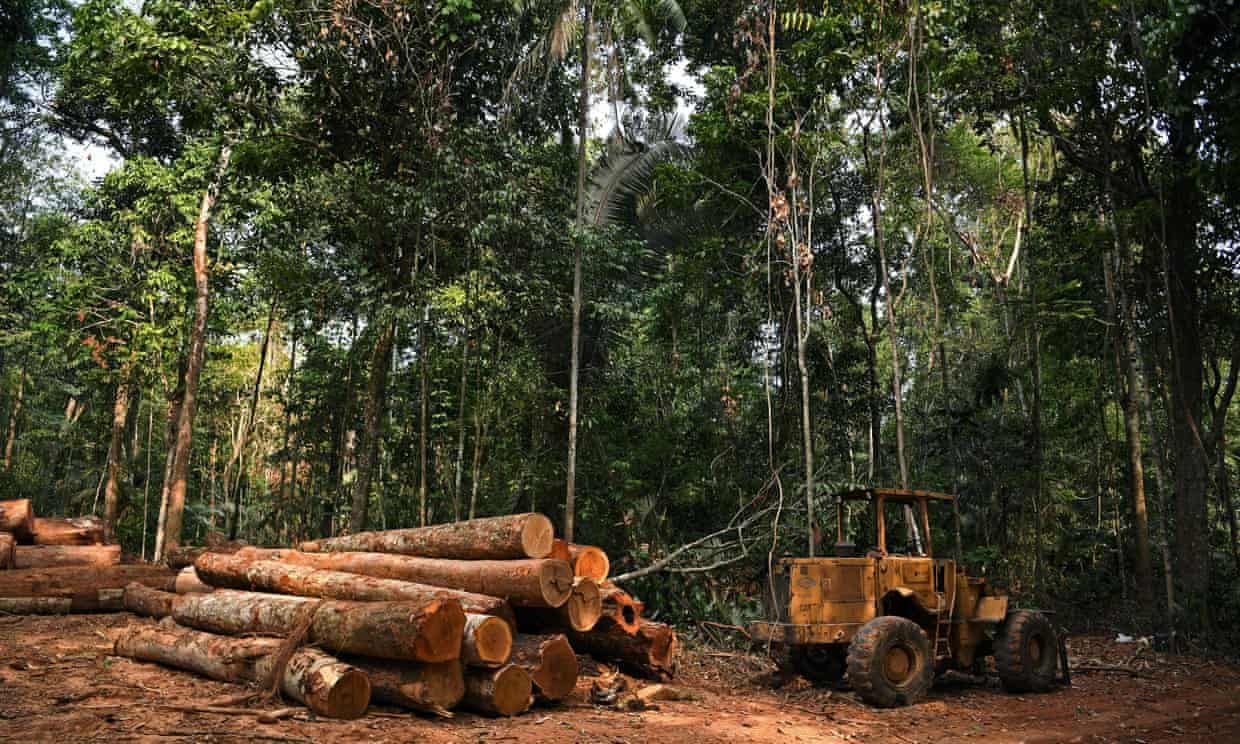
反對富豪瓜分世界.全球資源人民共享。People Before Profit!
A new study links major fashion brands to Amazon deforestation
Famous fashion brands like LVMH, Zara, Nike may be linked to Amazon rainforest deforestation

Author: Laura Pitcher
Source: The Guardian
Original publication date: November 29, 2021
Translation: Global Monitoring
Tanneries and other companies that supply leather goods to major fashion brands have been linked to deforestation in the Amazon rainforest, a report examining the fashion industry's complex global supply chain suggests.
The report analyzed nearly half a million lines of customs data and found that brands like Coach, LVMH, Prada, H&M, Zara, Adidas, Nike, New Balance, Teva, UGG and Fendi have multiple associations with industries that support deforestation in the Amazon.
Brazil's largest leather exporter, JBS, is known for its involvement in the deforestation of the Amazon, and more than 50 fashion brands are supply chain buyers for the company. JBS recently pledged to achieve zero deforestation in its global supply chain by 2035, but environmental groups say that is not enough.
The research was conducted by supply chain research firm Stand.Earth. The study's findings were surprising, in part because some of the brands surveyed had only recently announced policies to draw a line from suppliers that contribute to deforestation.
Greg Higgs, a researcher who participated in the report, said: "With one-third of the companies surveyed stating that they have policies in place, (you would expect) deforestation would decrease. But the rate of deforestation has been rising. increase, so these policies have no real effect.”
The researchers hope that one day the study can be extended to other industries that rely heavily on leather, such as the automotive industry.
In 2019 and 2020, Brazil was criticized by world leaders for not taking steps to protect forests from wildfires. Deforestation in key ecosystems continues at an alarming rate. Research shows that cattle farming is the biggest driver of Amazon rainforest deforestation, while the fashion industry is an important driver of leather exports.
In fact, forecasts show that the fashion industry will have to slaughter 430 million head of cattle a year by 2025 in order to continue selling to consumers wallets, handbags and shoes.
Their analysis did not prove a direct link between any fashion brand and Amazon deforestation; however, the researchers found links that increased the likelihood that any fashion item came from an Amazon cattle farm. The latter is the main culprit of local deforestation. The report lists fashion brands that participate in the Leather Working Group or other voluntary commitments, but emphasizes that the Leather Working Group's assessment of tanneries can only trace leather back to the slaughterhouse, not the farm.
"Our goal is to have a clear plan [for the fashion industry] and plug the loopholes," said Jungwan Kim, vice president of strategy at Slow Factory, a climate justice nonprofit that collaborated on the report.
Of the 84 companies analyzed in the report, 23 have explicit deforestation policies. Based on their findings, the researchers believe that the 23 companies "likely" violated their own policies. Fashion brand LVMH, for example, is at high risk associated with deforestation in the Amazon. The brand had pledged earlier this year to protect vulnerable areas with Unesco.
Sônia Guajajara, executive coordinator of the Federation of Indigenous Peoples of Brazil (APIB), said brands have the "moral responsibility, influence and economic resources" to stop working with suppliers that are deforesting the Amazon - "without It should be 10 years, let alone 2025.”
Recent wildfires in the Amazon have devastating consequences for indigenous peoples. They said President Jair Bolsonaro forcibly evicted indigenous peoples to make way for agriculture, mining and other development projects.
Investigator Angeline Robertson, who worked on the study, told the Guardian she hoped the fashion industry would take cues from their analysis to "do something for its own sake".
"In the midst of the climate crisis, if the fashion industry wants to be a part of mitigating the climate crisis, this is an opportunity," she said.
Céline Semaan, CEO and co-founder of Slow Factory, said fashion brands should not use this as an opportunity to turn to deforestation in other regions, such as Guatemala or Mexico, but should invest and explore alternatives.
As the lab grows more and more alternatives, it's possible a future where your favorite bag or sneaker doesn't come at the expense of the Amazon rainforest.
"At the end of the day, we have to find other solutions and other leather alternatives that don't come from animals or plastics. With the resources that fashion companies have, they have no excuse not to," Zeeman said.
--
Pay attention to the content released by #globalmonitoring
🔎 Website www.globalmon.org.hk
💡 Hong Kong independent media bit.ly/31q782d
🗂️ Facebook bit.ly/3dVlfQN
🐦 Twitter bit.ly/3aIz8Qm
📱 WeChat ID: globalmon
Like my work?
Don't forget to support or like, so I know you are with me..
Comment…